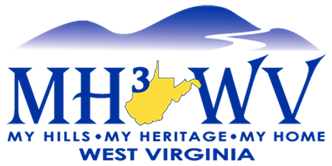African-Americans in West Virginia
West Virginia Studies
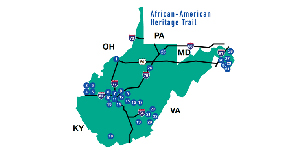
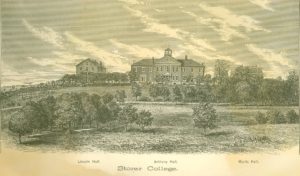
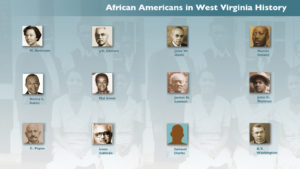
[African-Americans in West Virginia History graphic from WV State Museum Education]
“African-Americans in West Virginia play a pivotal role in the culture and history of the state. Rooted in servitude, their brave efforts would help tame wilderness, build industry and create the only state born of the Civil War.”
<< Here are the topics on this page; Click to jump/scroll down >>
“African-Americans in West Virginia” – West Virginia Archives and History
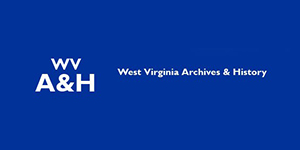
Includes:
>General
A Brief History of African-Americans in West Virginia
A Timeline of African-American History of West Virginia
Celebrating Lives: A Glimpse at African-Americans in West Virginia
History of the American Negro
“An ‘Ever-Present Bone of Contention’: The Heyward Shepherd Memorial,” by Mary Johnson (West Virginia History)
Illustrated Story of Beautiful Kanawha Valley, 1923,” by Edward A. McGhee
>Slavery
Antebellum Slavery
Daring Escape on the Underground Railroad (Time Trail)
“Slavery in Present West Virginia in 1860,” by Barbara Louise Emmerth (West Virginia History)
African-American Population of Present-Day West Virginia Counties in 1860
House of Delegates Proceedings on the Abolishment of Slavery, January 30, 1865
House of Delegates Proceedings on the Abolishment of Slavery, February 1, 1865
Senate Proceedings on the Abolishment of Slavery, February 3, 1865
Letter From Wheeling Regarding the Abolishment of Slavery in West Virginia
>Businesses and Institutions
J. R. Clifford and the Pioneer Press Newspaper
Pioneer Press Editorials, by J. R. Clifford
Establishment of the West Virginia Colored Tuberculosis Sanitarium (Time Trail)
“Deaths at the West Virginia Colored Tuberculosis Sanitarium at Denmar” (West Virginia History)
List of African American Hospitals, Physicians, and Dentists in West Virginia in 1922
Bachelor Benedict Club
>Education
Early Negro Education In West Virginia
Storer College
“The West Virginia Colored Institute”
Legislative Act Creating West Virginia Colored Institute
“A West Virginia Dilemma: Martin v. Board of Education, 1896,” by Douglas C. Smith (West Virginia History)
West Virginia Colored Orphans Home
Opening of the West Virginia Normal and Industrial School for Colored Orphans (Time Trail)
Jared Arter and the West Virginia College and Seminary at Hilltop (Time Trail)
Civilian Pilot Training Program at West Virginia State College (Time Trail)
“On the Homefront in World War II: Soldier-Scholars at West Virginia State College,” by Louis E. Keefer (West Virginia History)
School Integration in West Virginia
Integration of West Virginia’s Teachers’ Associations (Time Trail)
Violence at Bluefield State College
>Civil Rights
Niagara Movement Meets at Storer College in Harpers Ferry
Charleston Lawyer Blocks Premiere of Birth of a Nation (Time Trail)
Brown vs. Board of Education (Kanawha County)
West Virginia Upholds Anti-Lynching Law (Time Trail)
School Integration in West Virginia
Integration of West Virginia’s Teachers’ Associations (Time Trail)
Elgin Baylor Boycotts Basketball Game in Charleston
Integration of Charleston Lunch Counters (Time Trail)
Integration of The Diamond’s Lunch Counter
“Along U. S. 60: 50 Eating Places Refuse Negroes”
>Legal Cases
Taylor Strauder Case
Brown vs. Board of Education (Kanawha County)
West Virginia Upholds Anti-Lynching Law (Time Trail)
>Sports
First State Basketball Tournament for Black Athletes (Time Trail)
West Virginia State College Wins the National Black Basketball Championship (Time Trail)
Elgin Baylor Boycotts Basketball Game in Charleston
>Individuals
Biography of Jared Maurice Arter
Fannie Cobb Carter
Cornelius Charlton
Biography of J. R. Clifford
John Warren Davis
Biography of Martin Delany
Biography of Elizabeth Simpson Drewry
Henry Louis Gates Jr.
Biography of Hal Greer
Hanging of John Hardy
Roscoe C. Harrison
John Henry
Death of Former State Law Librarian James Arthur Jackson
J. McHenry Jones
Martin Luther King in West Virginia
Lawson Family Genealogy
Biography of Charles E. McGhee
Leon Miller
Biography of Mildred Mitchell-Bateman
Biography of John C. Norman, Jr.
Christopher Payne
Dick Pointer and the Attack on Fort Donnally
Byrd Prillerman
Biography of Samuel W. Starks
Leon Sullivan
Booker T. Washington
Carter G. Woodson
>Collection Finding Aids
Ancella Bickley Collection
Elaine Blue Collection
Ken Blue Collection
Anderson Brown Collection
Lee Carol Cook Collection
Elizabeth Gilmore Collection
Harden and Harden Funeral Home Collection
Tanner J. Livisay Collection
John C. Norman Sr. Collection
Dr. John C. Norman Collection
Norman Family Collection
Preston Funeral Home Records Collection
Josephine Morris Rayford Collection
West Virginia Medical Society Collection
Mary L. Williams Collection
Harriette Wright Collection
“His Soul Goes Marching On – The Life and Legacy of John Brown” (Online Exhibit)

“Celebrating Lives: A Glimpse at African-Americans in West Virginia” (Online Exhibit)
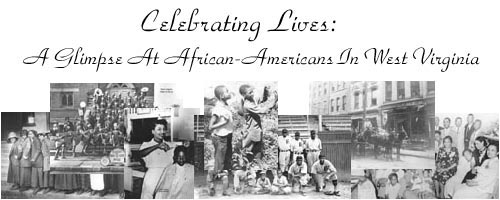
“Segregated Schools in West Virginia” – West Virginia Public Broadcasting
“ West Virginia’s all-black schools went away after the 1954 US Supreme Court decision that declared the establishment of separate public schools for black and white students was unconstitutional.” (3:54/2011/ WV Public Broadcasting)
West Virginia’s all-black schools went away after the 1954 US Supreme Court decision that declared the establishment of separate public schools for black and white students was unconstitutional.” (3:54/2011/ WV Public Broadcasting)
“Civil Rights in West Virginia” – West Virginia State Museum Education
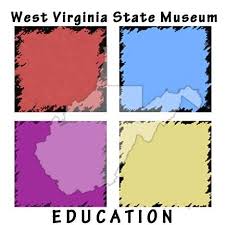 (4:06/2016/ WV Museum Education)
(4:06/2016/ WV Museum Education)
“Celebrating African-American Historic Places in West Virginia” – West Virginia State Historic Preservation Office

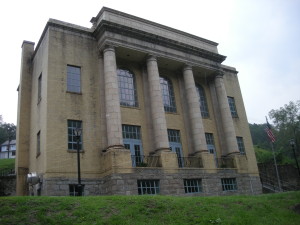 “The National Register of Historic Places recognizes both public and private resources associated with our nation’s history. The West Virginia State Historic Preservation Office is pleased to highlight some of the historic resources in West Virginia which are associated with black history and which are listed on the National Register of Historic Places. This list showcases only those sites which are listed individually. There are other sites which are listed as part of larger nominations, such as historic districts. And, there are other sites related to African American history which have not been listed.” [List compiled in 2012]
“The National Register of Historic Places recognizes both public and private resources associated with our nation’s history. The West Virginia State Historic Preservation Office is pleased to highlight some of the historic resources in West Virginia which are associated with black history and which are listed on the National Register of Historic Places. This list showcases only those sites which are listed individually. There are other sites which are listed as part of larger nominations, such as historic districts. And, there are other sites related to African American history which have not been listed.” [List compiled in 2012]
<<Clicking a link will take you to the National Register of Historic Places’ Nomination Form or Registration Form for that location, as found on Archive.org’s “Wayback Machine.”>>
Zion Baptist Church, Malden, Kanawha County
http://www.wvculture.org/shpo/nr/pdf/kanawha/74002010.pdf
Barnett Hospital and Nursing School, Huntington, Cabell County
http://www.wvculture.org/shpo/nr/pdf/cabell/09001190.pdf
Bluefield State College President’s House, Bluefield, Mercer County
http://www.wvculture.org/shpo/nr/pdf/mercer/99001400.pdf
Camp Washington Carver Complex, Clifftop, Fayette County
http://www.wvculture.org/shpo/nr/pdf/fayette/80004017.pdf
Douglass Junior and Senior High School, Huntington, Cabell County
http://www.wvculture.org/shpo/nr/pdf/cabell/85003091.pdf
East Hall, Institute, Kanawha County
http://www.wvculture.org/shpo/nr/pdf/kanawha/88001585.pdf
Elizabeth Harden Gilmore House, Charleston, Kanawha County
http://www.wvculture.org/shpo/nr/pdf/kanawha/88001462.pdf
Garnet High School, Charleston, Kanawha County
http://www.wvculture.org/shpo/nr/pdf/kanawha/90001068.pdf
Halltown Colored Free School, Halltown, Jefferson County
http://www.wvculture.org/shpo/nr/pdf/jefferson/04000912.pdf
Halltown Union Colored Sunday School, Halltown, Jefferson County
http://www.wvculture.org/shpo/nr/pdf/jefferson/84003591.pdf
Hancock House, Bluefield, Mercer County
http://www.wvculture.org/shpo/nr/pdf/mercer/89001783.pdf
Indian Rocks Dining Hall, Reedsville Vicinity, Preston County
http://www.wvculture.org/shpo/nr/pdf/preston/02001688.pdf
John Wesley Methodist Church, Lewisburg, Greenbrier County
http://www.wvculture.org/shpo/nr/pdf/greenbrier/74001997.pdf
Maple Street Historic District, Lewisburg, Greenbrier County
http://www.wvculture.org/shpo/nr/pdf/greenbrier/87002529.pdf
Mattie Lee Home, Charleston, Kanawha County
http://www.wvculture.org/shpo/nr/pdf/kanawha/92000303.pdf
Mount Pleasant School, Gerrardstown Vicinity, Berkeley County
http://www.wvculture.org/shpo/nr/pdf/berkeley/08000928.pdf
Mount Tabor Baptist Church, Lewisburg, Greenbrier County
http://www.wvculture.org/shpo/nr/pdf/greenbrier/76001934.pdf
Riverside School, Elkins, Randolph County
http://www.wvculture.org/shpo/nr/pdf/randolph/09001194.pdf
Samuel Starks House, Charleston, Kanawha County
http://www.wvculture.org/shpo/nr/pdf/kanawha/87002526.pdf
Second Ward Negro Elementary School, Morgantown, Monongalia County
http://www.wvculture.org/shpo/nr/pdf/monongalia/92000896.pdf
Simpson Memorial Methodist Episcopal Church, Charleston, Kanawha County
http://www.wvculture.org/shpo/nr/pdf/kanawha/91001011.pdf
Storer College, Harpers Ferry, Jefferson County
http://www.wvculture.org/shpo/nr/pdf/jefferson/01000781.pdf
Weston Colored School, Weston, Lewis County
http://www.wvculture.org/shpo/nr/pdf/lewis/93000224.pdf
World War Memorial, Kimball, McDowell County
http://www.wvculture.org/shpo/nr/pdf/mcdowell/93000227.pdf
“Legacy Intact – McDowell is Home to Only Memorial for Black WW1 Veterans”
June 11, 2021
![]() “The roots of America’s Veterans Day observance can be traced back to the 11th hour of the 11th day of the 11th month of 1918 when a cease-fire went into effect, ending hostilities in WW1. . .”
“The roots of America’s Veterans Day observance can be traced back to the 11th hour of the 11th day of the 11th month of 1918 when a cease-fire went into effect, ending hostilities in WW1. . .”
Explore Charleston Gazette-Mail’s “Legacy Intact. . .” article to continue reading (pdf)
“African-American Heritage Trail” – West Virginia Tourism

 “African-Americans play a pivotal role in the culture and history of West Virginia. Rooted in servitude, their brave efforts would help tame wilderness, build industry and create the only state born of the Civil War.”
“African-Americans play a pivotal role in the culture and history of West Virginia. Rooted in servitude, their brave efforts would help tame wilderness, build industry and create the only state born of the Civil War.”“The African-American presence in West Virginia dates from the 1780s, when European exploring parties brought slaves to the Greenbrier and New River valleys. During the French and Indian Wars, blacks aided the army as it moved through the New River and Big Sandy valleys up toward the Ohio River and helped to stake claims for white settlers. . . “
Explore West Virginia Tourism’s “African-American Heritage Trail” Brochure – (2013) – pdf
“Camp Washington-Carver Virtual Museum Exhibit”
“WELCOME to Marshall University Libraries’ virtual exhibit of Camp Washington-Carver, located near Clifftop, Fayette County, West Virginia. “The camp was established in 1942 as a summer camp for African-American youth. Initially called the ” West Virginia Negro 4-H Camp,” its name was soon changed to “Camp Washington-Carver” in honor of two prominent black Americans: Booker T. Washington and George Washington Carver.Originally administered by West Virginia State College, in 1978 the West Virginia Division of Culture and History received responsibility for the camp, which was rededicated in 1980. Since that time it has continued to serve as a mountain arts cultural center, as well as a general camp for various groups.
“The camp was established in 1942 as a summer camp for African-American youth. Initially called the ” West Virginia Negro 4-H Camp,” its name was soon changed to “Camp Washington-Carver” in honor of two prominent black Americans: Booker T. Washington and George Washington Carver.Originally administered by West Virginia State College, in 1978 the West Virginia Division of Culture and History received responsibility for the camp, which was rededicated in 1980. Since that time it has continued to serve as a mountain arts cultural center, as well as a general camp for various groups. “The exhibit focuses on the camp’s early period through the eyes of those who either worked there or enjoyed its facilities as children. The camp’s story is presented through the use of still pictures, audio recordings, transcribed interviews, and moving pictures.”
“The exhibit focuses on the camp’s early period through the eyes of those who either worked there or enjoyed its facilities as children. The camp’s story is presented through the use of still pictures, audio recordings, transcribed interviews, and moving pictures.”
“African American Heritage Auto Tour” – New River Gorge National Park and Preserve

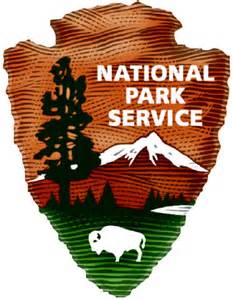 “The African American Heritage Tour was developed by New River Gorge National Park and Preserve and its partners as a smart phone app to uncover and tell the stories of the many black coal miners, railroad workers, and other community members that helped shape this region. This self-guided auto tour takes the user to seventeen historic sites in Summers, Raleigh, Fayette and Nicholas counties to learn about the history and experiences of the regions African Americans. The project was made possible through a partnership with the New River Gorge Regional Development Authority, The National Coal Heritage Area, the West Virginia Humanities Council, The African American Heritage Family Tree Museum, DuBois on Main Museum, West Virginia State University, and Visit Southern West Virginia.”
“The African American Heritage Tour was developed by New River Gorge National Park and Preserve and its partners as a smart phone app to uncover and tell the stories of the many black coal miners, railroad workers, and other community members that helped shape this region. This self-guided auto tour takes the user to seventeen historic sites in Summers, Raleigh, Fayette and Nicholas counties to learn about the history and experiences of the regions African Americans. The project was made possible through a partnership with the New River Gorge Regional Development Authority, The National Coal Heritage Area, the West Virginia Humanities Council, The African American Heritage Family Tree Museum, DuBois on Main Museum, West Virginia State University, and Visit Southern West Virginia.”
“7 Fascinating Facts about African American Heritage in Southern West Virginia” – Visit Southern West Virginia
February 18, 2018
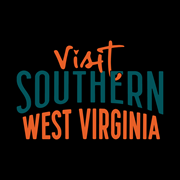 “February is Black History Month, and southern West Virginia has an incredible African American history. Let’s take a trip through time and celebrate our African American heritage.”
“February is Black History Month, and southern West Virginia has an incredible African American history. Let’s take a trip through time and celebrate our African American heritage.”
“Celebrate Black History Month in Southern West Virginia”
February 4, 2022
 “As we celebrate Black History Month in Southern West Virginia, we’re taking a look at some of our most prominent Black leaders and historical sites where you can learn more about the rich African American history of our region.”
“As we celebrate Black History Month in Southern West Virginia, we’re taking a look at some of our most prominent Black leaders and historical sites where you can learn more about the rich African American history of our region.”
“Storer College” – West Virginia Tourism

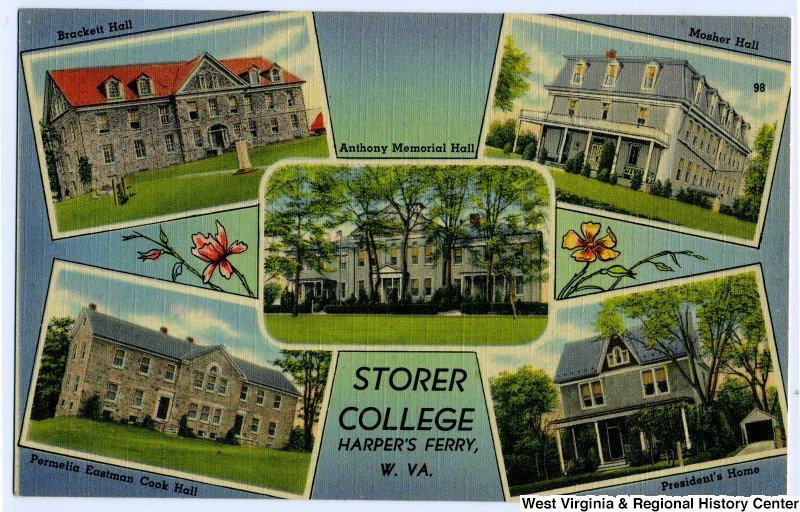 “Storer College contributed much more to African-American history than just becoming West Virginia’s first institution of higher learning for black students. Among the Board of Trustees was Frederick Douglas, the influential abolitionist who was an excellent orator and spoke on campus in 1891. In 1906, Storer College was the site of the Niagara Movement’s second meeting because of the connection to abolitionist John Brown. This meeting brought notable African-Americans W.E.B. Dubois and J.R. Clifford, among others, to Storer. The Niagara Movement was a precursor to the National Association for the Advancement of Colored People (NAACP). Among some of the outstanding alumnus of Storer College were: J.R. Clifford, the first black lawyer in West Virginia; Coralie Franklin Cook, a distinguished professor at Howard University; Joseph Jeffery Walters, author of Guanya Pau which was the first African-American novel to be published in English; Don Redman, the “Little Giant of Jazz” was the first great arranger in jazz history; and Nnamdi Azikiwe, the former President of Nigeria.”
“Storer College contributed much more to African-American history than just becoming West Virginia’s first institution of higher learning for black students. Among the Board of Trustees was Frederick Douglas, the influential abolitionist who was an excellent orator and spoke on campus in 1891. In 1906, Storer College was the site of the Niagara Movement’s second meeting because of the connection to abolitionist John Brown. This meeting brought notable African-Americans W.E.B. Dubois and J.R. Clifford, among others, to Storer. The Niagara Movement was a precursor to the National Association for the Advancement of Colored People (NAACP). Among some of the outstanding alumnus of Storer College were: J.R. Clifford, the first black lawyer in West Virginia; Coralie Franklin Cook, a distinguished professor at Howard University; Joseph Jeffery Walters, author of Guanya Pau which was the first African-American novel to be published in English; Don Redman, the “Little Giant of Jazz” was the first great arranger in jazz history; and Nnamdi Azikiwe, the former President of Nigeria.”
“Storer College” – Harpers Ferry NHP

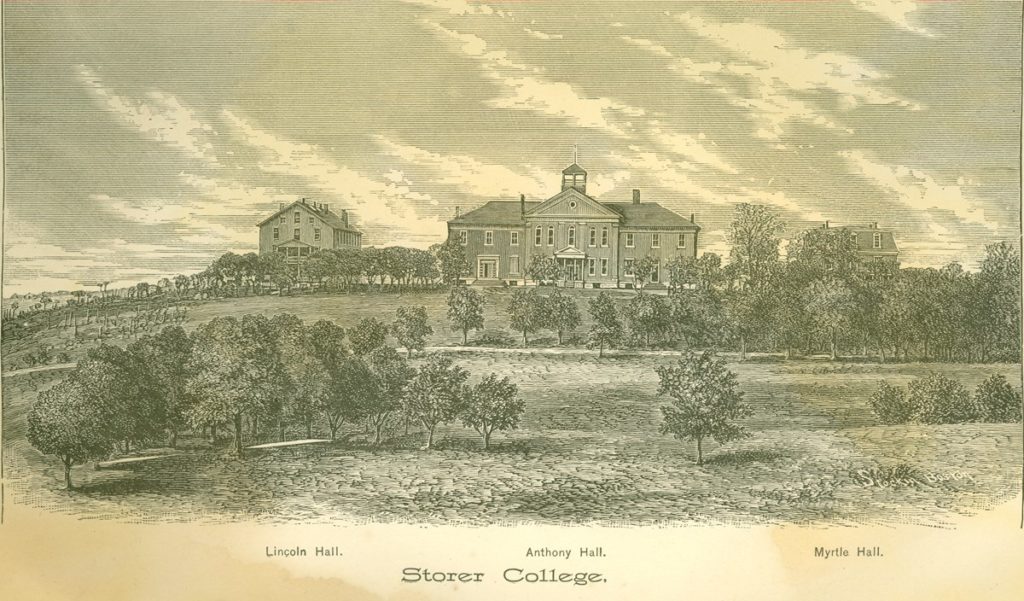 “Following the Civil War there were over 30,000 newly freed slaves in the Shenandoah Valley. Recognizing the need for education, the Freedmen’s Bureau, the Freewill Baptists of New England and John Storer came together and Storer College was born. The school survived for 88 years, enriching the lives of hundreds of students. . .”
“Following the Civil War there were over 30,000 newly freed slaves in the Shenandoah Valley. Recognizing the need for education, the Freedmen’s Bureau, the Freewill Baptists of New England and John Storer came together and Storer College was born. The school survived for 88 years, enriching the lives of hundreds of students. . .”
Explore Harpers Ferry National Historical Park’s “Storer College” Website
“Storer College Celebrates 150-Year Legacy” – West Virginia Public Broadcasting
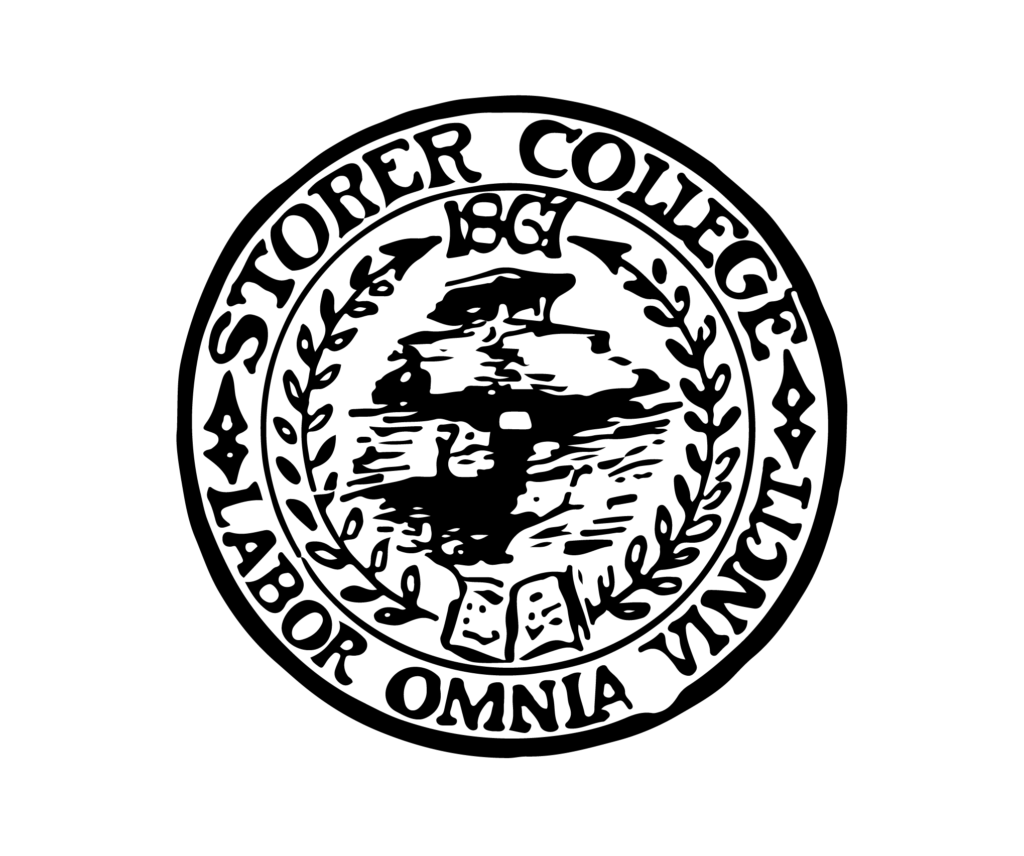
![]() “This year [2017] marks 150 years since Storer College was established in Harpers Ferry. The school came out of the Civil War first as a place to teach former slaves how to read and write, and then by the 1930s, it had evolved into a four-year, higher education institution for African-Americans. But in 1955, it closed due to lack of funding. Still, the legacy of Storer College continues to be celebrated each year in the Eastern Panhandle.”
“This year [2017] marks 150 years since Storer College was established in Harpers Ferry. The school came out of the Civil War first as a place to teach former slaves how to read and write, and then by the 1930s, it had evolved into a four-year, higher education institution for African-Americans. But in 1955, it closed due to lack of funding. Still, the legacy of Storer College continues to be celebrated each year in the Eastern Panhandle.”
Explore West Virginia Public Broadcasting’s “Storer College Celebrates 150-Year Legacy” Website
“West Virginia Center for African-American Art & Culture”
 “The West Virginia Center for African-American Art & Culture, Inc. is a non-profit organization established to provide an enhanced cultural learning experience for all visitors. We are a diverse group of individuals with over twenty years of service through organizational community involvement. We share a belief in cultural and ethnic diversity—the embodiment of our multicultural society.”
“The West Virginia Center for African-American Art & Culture, Inc. is a non-profit organization established to provide an enhanced cultural learning experience for all visitors. We are a diverse group of individuals with over twenty years of service through organizational community involvement. We share a belief in cultural and ethnic diversity—the embodiment of our multicultural society.”
Our Projects:
- “The Block” Historic District
- “The Block” Speaker Series
- The Valley Heritage Tour
- African-American / Jewish Dialogue
- Your Voice in History: Oral History Recordings Project
Explore “West Virginia Center for African-American Art & Culture” Website
“A Walk Around ‘The Block’ ”
![]()
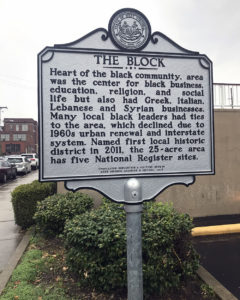 “Community keeps memory of historic African-American district alive.”
“Community keeps memory of historic African-American district alive.”
Explore information from Daily Mail WV’s “A Walk around the Block” story — (pdf)
“Henry Highland Garnet: Namesake of Garnet High School”
![]()
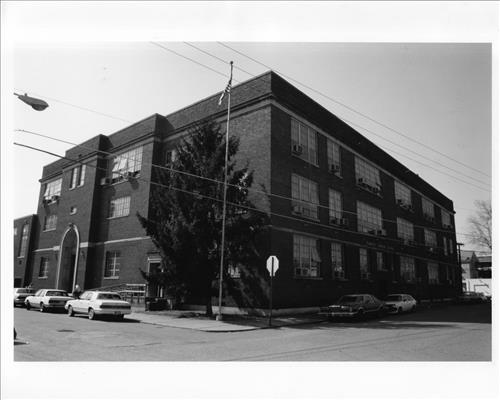 “In 1882, C.W. Boyd moved from Mt. Sterling, Kentucky, to Charleston. Boyd would establish a Charleston-area institution named after a famous African-American pioneer . . .”
“In 1882, C.W. Boyd moved from Mt. Sterling, Kentucky, to Charleston. Boyd would establish a Charleston-area institution named after a famous African-American pioneer . . .”
“J. R. Clifford Project” – Friends of Blackwater
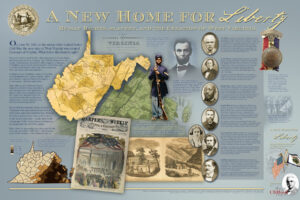
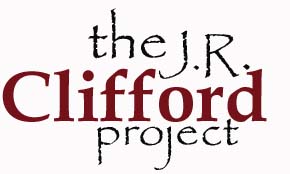 “Friends of Blackwater (“FOB”) is pleased to have added the J. R. Clifford Project to its range of programs that includes heritage education and environmental preservation programs . . . J. R. Clifford (1848-1933), West Virginia’s first African American attorney, is among twelve Civil Rights Pioneers announced as honorees on a 2009 Commemorative Stamp sheet issued by the United States Postal Service.”
“Friends of Blackwater (“FOB”) is pleased to have added the J. R. Clifford Project to its range of programs that includes heritage education and environmental preservation programs . . . J. R. Clifford (1848-1933), West Virginia’s first African American attorney, is among twelve Civil Rights Pioneers announced as honorees on a 2009 Commemorative Stamp sheet issued by the United States Postal Service.”
“Since December 2004, The J. R. Clifford Project has involved thousands of West Virginians and visitors to the Mountain State in statewide and local educational programs to increase awareness of the life and works of John Robert “J. R.” Clifford. The programs reflect Clifford’s opposition to racism and highlight the supportive role West Virginia has played in upholding American civil rights.”
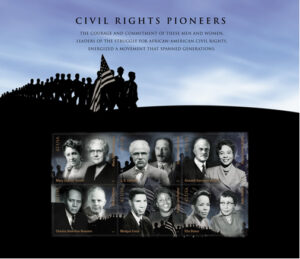 From West Virginia Dept of Education’s “Social Studies Resources” Webpage: “Friends of Blackwater (“FOB”) is pleased to have added the J. R. Clifford Project to its range of programs that includes heritage education and environmental preservation programs. A key element of their work is to build awareness and support for the JR Clifford lesson plans in schools around the state. Lesson plans can be downloaded from www.jrclifford.org. J. R. Clifford (1848-1933), West Virginia’s first African American attorney, is among twelve Civil Rights Pioneers announced as honorees on a 2009 Commemorative Stamp sheet issued by the United States Postal Service.”
From West Virginia Dept of Education’s “Social Studies Resources” Webpage: “Friends of Blackwater (“FOB”) is pleased to have added the J. R. Clifford Project to its range of programs that includes heritage education and environmental preservation programs. A key element of their work is to build awareness and support for the JR Clifford lesson plans in schools around the state. Lesson plans can be downloaded from www.jrclifford.org. J. R. Clifford (1848-1933), West Virginia’s first African American attorney, is among twelve Civil Rights Pioneers announced as honorees on a 2009 Commemorative Stamp sheet issued by the United States Postal Service.”
“Since December 2004, The J. R. Clifford Project has involved thousands of West Virginians and visitors to the Mountain State in statewide and local educational programs to increase awareness of the life and works of John Robert “J. R.” Clifford. The programs reflect Clifford’s opposition to racism and highlight the supportive role West Virginia has played in upholding American civil rights.”
Explore Friends of Blackwater’s “J.R.Clifford Project” Website
Explore U.S. Postal Service’s “Civil Rights Pioneers Honored on Stamps” Press Release (pdf) (2009)
“West Virginia’s Shining Civil Rights Moment” – MetroNews
![]()
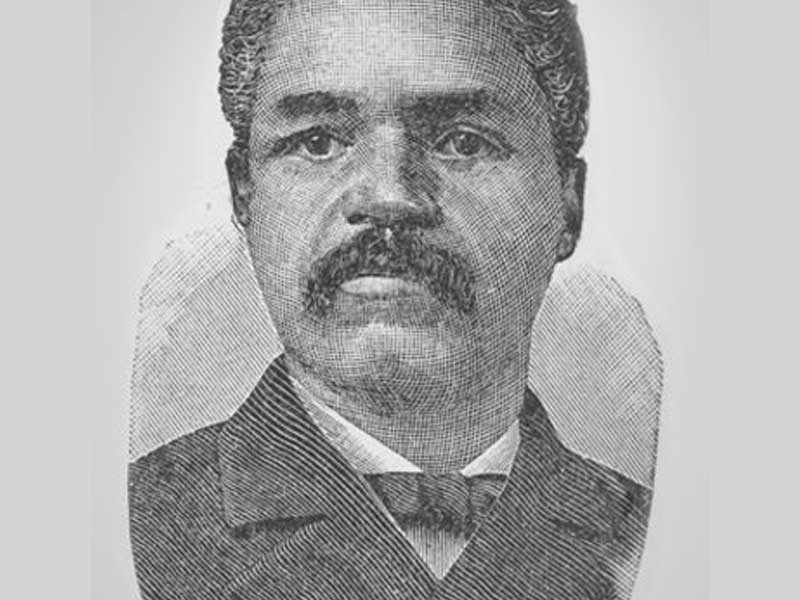 “One hundred and twenty years ago . . . , the West Virginia Supreme Court made one of its most significant decisions in the state’s history on the issue of civil rights. The case was Williams v. Board of Education of Fairfax District. . . “
“One hundred and twenty years ago . . . , the West Virginia Supreme Court made one of its most significant decisions in the state’s history on the issue of civil rights. The case was Williams v. Board of Education of Fairfax District. . . “
“6 times West Virginia was vital to the Civil Rights Movement” – West Virginia Tourism
 “West Virginia has been the centerpiece of several key events in African-American heritage– dating all the way back to before it was a state.”
“West Virginia has been the centerpiece of several key events in African-American heritage– dating all the way back to before it was a state.”
Includes: John Brown’s Raid; Williams v. Board of Education; Tuskegee Institute; The Niagara Movement; The Father of Black History; First Female African-American Legislator.
“Notable African-Americans in West Virginia” – West Virginia Tourism
 A list from approximately 2012.
A list from approximately 2012.
“OUTLIER: The Story of Katherine Johnson”
“In mathematical terms, an outlier is a data point that is unique and apart from the others. It’s an apt description for a person too, that is outside the norms. “Outlier: the story of Katherine Johnson” is a one-hour documentary about the trajectory of an African American girl-wonder, whose mathematical genius would catapult astronauts into space. Born in the days of segregation in White Sulphur Springs, West Virginia, Katherine’s story was featured in the highly-acclaimed Hollywood movie, “Hidden Figures.” Hear her story in her own words in “Outlier.”
The Trailer: (4:53/2017 / motionmasters)
An additional excerpt: (2:43/2017/motionmasters)
“Katherine Johnson | NASA Computer”
 “Examine the life and career of NASA computer Katherine Johnson, and engage students in a discussion of the qualities Johnson exhibited that helped her break racial and gender barriers.”
“Examine the life and career of NASA computer Katherine Johnson, and engage students in a discussion of the qualities Johnson exhibited that helped her break racial and gender barriers.”
“Hidden Stories: Dorothy Vaughan”
 “The story of Dorothy Vaughan, a groundbreaking African-American mathematician and human computer who worked for NASA and helped put humans on the Moon. Produced by Morehead Planetarium and Science Center and students from the UNC-Chapel Hill School of Media and Journalism.” (2:19/2018/Morehead Planetarium and Science Center at University of North Carolina at Chapel Hill)
“The story of Dorothy Vaughan, a groundbreaking African-American mathematician and human computer who worked for NASA and helped put humans on the Moon. Produced by Morehead Planetarium and Science Center and students from the UNC-Chapel Hill School of Media and Journalism.” (2:19/2018/Morehead Planetarium and Science Center at University of North Carolina at Chapel Hill)
 “American mathematician and computer programmer who made important contributions to the early years of the U.S. space program and who was the first African American manager at the National Advisory Committee for Aeronautics (NACA), which later became part of the National Aeronautics and Space Administration (NASA).” (4:54/2020/ Matematickcom Official
“American mathematician and computer programmer who made important contributions to the early years of the U.S. space program and who was the first African American manager at the National Advisory Committee for Aeronautics (NACA), which later became part of the National Aeronautics and Space Administration (NASA).” (4:54/2020/ Matematickcom Official
“Rev. Leon Sullivan – A Principled Man”
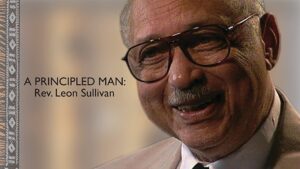
“Rev. Leon Sullivan has been called the tallest tree in the forest. At 6’5″ tall, he fits the physical description, and his achievements reflect an equally impressive stature. Born in West Virginia on October 16, 1922, he was a preacher, civil rights activist and educator who affected change at the national and international levels. One of his greatest achievements was the development of a code of equal opportunity that helped to end apartheid in South Africa. Rev. Sullivan passed away on April 24, 2001.”
![]() “The purpose of this documentary and supporting materials is to inform people about this principled giant and his accomplishments.”
“The purpose of this documentary and supporting materials is to inform people about this principled giant and his accomplishments.”
An Excerpt : (3:39/2009 / motionmasters)
“Rev. Leon Sullivan Tribute” — “This tribute video produced by MotionMasters is an edited down version of the full hour long documentary “A Principled Man: Rev. Leon Sullivan” (11:40/2017 / motionmasters)
“Carter Woodson”
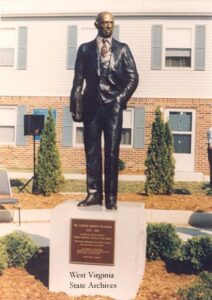
![]() “Carter G. Woodson, a graduate of Huntington’s old all-black Douglass High School who went on to earn a Ph.D. from Harvard University, is widely recognized as the ‘Father of Black History Month. . .”
“Carter G. Woodson, a graduate of Huntington’s old all-black Douglass High School who went on to earn a Ph.D. from Harvard University, is widely recognized as the ‘Father of Black History Month. . .”
Continue reading at Huntington Quarterly’s “Carter Woodson” article (pdf)
“Carter Woodson credited for initial Black History Week”
February 2020

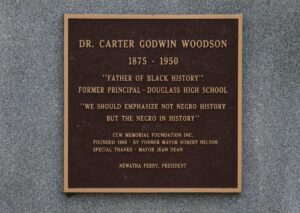 “This month [February], the nation turns to honoring black Americans for their achievements. Initially, it was a week and now it’s a month. Adrienne Cannon knows all about Carter G. Woodson. She’s the Afro-American history and culture specialist for the manuscript division of the Library of Congress. The library is the keeper of 18,000 items from Woodson’s collection of papers that he started donating in 1929. Everything from a letter from Paul Laurence Dunbar High School in Baltimore, to a manuscript of a poem by Dunbar and slave bills of sale and slave freedom papers.
“This month [February], the nation turns to honoring black Americans for their achievements. Initially, it was a week and now it’s a month. Adrienne Cannon knows all about Carter G. Woodson. She’s the Afro-American history and culture specialist for the manuscript division of the Library of Congress. The library is the keeper of 18,000 items from Woodson’s collection of papers that he started donating in 1929. Everything from a letter from Paul Laurence Dunbar High School in Baltimore, to a manuscript of a poem by Dunbar and slave bills of sale and slave freedom papers.
The collecting, research and writing and publishing he did on the black past in the early 20th century laid the foundation for the study of African American history as a legitimate field of inquiry,” Cannon said.
Woodson was born in 1875 in New Canton, Virginia, to former slaves. “I think that connection to slavery was the impetus for his interest in recording the black past,” Cannon said. Woodson worked in the coal mines of West Virginia as a young man, but went on to earn his bachelor’s and master’s degrees, eventually going to Harvard on an American history scholarship.
“He was the only African American born to former slave parents to receive a PhD in history and he was the second to receive a PhD in history from Harvard. The first was W.E.B. Dubois,” Cannon said. Woodson also served as a teacher, a principal and a publisher. He wrote “The Negro In Our History.” He started the Publication Journal of Negro History in 1916 and to help teachers with African American studies, he created the Negro History Bulletin. The historian and writer of more than a dozen books lobbied schools and organizations to take part in a special program to encourage the study of black history.
“It was celebrated first as negro history week and it was celebrated the second week in February to encompass the birthdays of Abe Lincoln and Frederick Douglass,” Cannon said. He chose that week in order to reach blacks and whites, because he believed recording and disseminating black history could advance race relations. “As he indicated in his book “The Negro in Our History,” it was not to celebrate negro history but the negro in all history, our history,” Cannon said.” (2:39/2020/WBAL-TV 11 Baltimore)
 “As Black History Month comes to an end, Adriana Diaz takes a look at the legacy of Carter G. Woodson. The son of former slaves, Woodson founded the organization that created Negro Achievement Week, the precursor to Black History Month.” (1:35/2023/ CBS Evening News)
“As Black History Month comes to an end, Adriana Diaz takes a look at the legacy of Carter G. Woodson. The son of former slaves, Woodson founded the organization that created Negro Achievement Week, the precursor to Black History Month.” (1:35/2023/ CBS Evening News)
“John Warren Davis”
November 25, 2022
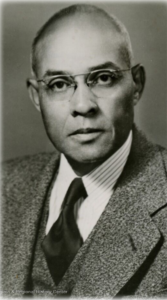 “John Warren Davis – A trailblazing West Virginia educator – WVSU first came to national prominence under Davis’ guidance”
“John Warren Davis – A trailblazing West Virginia educator – WVSU first came to national prominence under Davis’ guidance”
![]() “For nearly the first century of our nation’s history, formal education was reserved almost exclusively for the wealthy who could afford private schools. Very few educational opportunities existed for African Americans, and Southern states made it a crime to educate slaves. In the middle of the Civil War, which ultimately ended the inhuman practice of American slavery, Congress began to address national educational inequities. . .”
“For nearly the first century of our nation’s history, formal education was reserved almost exclusively for the wealthy who could afford private schools. Very few educational opportunities existed for African Americans, and Southern states made it a crime to educate slaves. In the middle of the Civil War, which ultimately ended the inhuman practice of American slavery, Congress began to address national educational inequities. . .”
Explore Daily Mail WV’s “John Warren Davis” article — part 1 (pdf)
Explore Daily Mail WV’s “John Warren Davis” article — part 2 (pdf)
“Bill Withers”
May 22, 2021
![]()
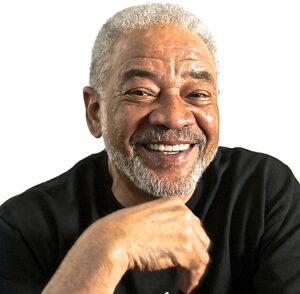 “The West Virginia Division of Highways has installed a new sign renaming a Raleigh County road in honor of a music legend. Slab Fork Road between Lester Highway and the Coalfields Expressway is now known as Bill Withers Memorial Road. . .
“The West Virginia Division of Highways has installed a new sign renaming a Raleigh County road in honor of a music legend. Slab Fork Road between Lester Highway and the Coalfields Expressway is now known as Bill Withers Memorial Road. . .
‘ “Our people take a lot of pride in putting the signs up when we have a road naming. That was especially true of this one because of the way Bill Withers’ songs resonate with our workers. The uplifting messages in some of his songs really helped us get through the last year we’ve had.”
“Withers, who died in March 2020, is best known for the songs “Ain’t No Sunshine,” “Lovely Day” and “Lean on Me.” He was inducted into the Rock and Roll Hall of Fame in 2015.”
April 4, 2020
 ” ‘Lean On Me’ singer Bill Withers dies at 81″
” ‘Lean On Me’ singer Bill Withers dies at 81″
“Soul legend Bill Withers, known for songs like “Lean On Me” and “Ain’t No Sunshine,” has died at the age of 81. The three-time Grammy Award winner’s family said he died of heart complications. The singer’s hit “Lean on Me” has been a source of comfort for many…” (2:36/2020 / CBS This Morning)
“A Conversation With Bill Withers”
 “Anna Sale talks to Bill Withers about his music and growing up in West Virginia. In November, Withers returned to his home state to be inducted into the West Virginia Music Hall of Fame. His hits include “Lean On Me,” “Ain’t No Sunshine,” and “Just the Two of Us.” This segment first aired Dec. 13, 2007, on the program “Outlook.” Russ Barbour co-produced the piece.” (9:56/2007/West Virginia Public Broadcasting)
“Anna Sale talks to Bill Withers about his music and growing up in West Virginia. In November, Withers returned to his home state to be inducted into the West Virginia Music Hall of Fame. His hits include “Lean On Me,” “Ain’t No Sunshine,” and “Just the Two of Us.” This segment first aired Dec. 13, 2007, on the program “Outlook.” Russ Barbour co-produced the piece.” (9:56/2007/West Virginia Public Broadcasting)
“The West Virginian that helped invent Rock ‘n’ Roll”
Apr 9, 2023
![]() “. . .A music legend in his own right, Johnnie Clyde Johnson was born on July 8, 1924, in Fairmont, West Virginia. Playing piano since the age of five, Johnson grew up around a variety of music, including jazz, boogie-woogie, ‘‘hillbilly’’ and big band, according to wvencyclopedia.org. . .”
“. . .A music legend in his own right, Johnnie Clyde Johnson was born on July 8, 1924, in Fairmont, West Virginia. Playing piano since the age of five, Johnson grew up around a variety of music, including jazz, boogie-woogie, ‘‘hillbilly’’ and big band, according to wvencyclopedia.org. . .”
Explore WBOY’s “The West Virginian that helped invent Rock ‘n’ Roll” article to continue reading
“The HistoryMakers”
“By recording, preserving and sharing the life stories of thousands of African Americans, from President Barack Obama to the oldest living black cowboy, The HistoryMakers is a leader in helping to educate and enlighten millions worldwide through refashioning a more inclusive record of American history.”
Explore “The HistoryMakers” Website
“HistoryMaker: Henry Louis Gates Jr.”
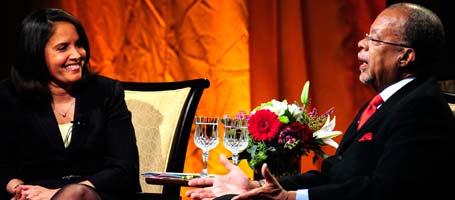 “West Virginia Celebrates its HistoryMakers”
“West Virginia Celebrates its HistoryMakers”
“On Thursday, February 18, 2010, The HistoryMakers project interviewed Henry Louis Gates Jr. and three other West Virginia honorees: Dr. Hazo W. Carter Jr., Lou Myers and Andrea L. Taylor. The event was sponsored by Verizon, West Virginia, and held at the West Virginia Culture Center, Charleston.”
Explore Information from “HistoryMaker: Henry Louis Gates Jr.” (deactivated) Website (pdf)
“Because They Deserve It”
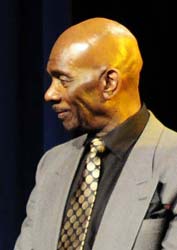
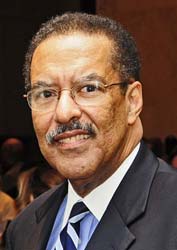
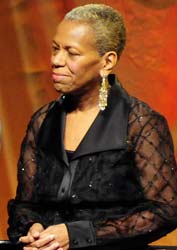 “While the evening was focused on Henry Lewis Gates Jr., it was also about other West Virginians who have made great accomplishments. The HistoryMakers project honored Dr. Hazo W. Carter Jr., Lou Myers and Andrea L. Taylor as part of the West Virginia taping, too.”
“While the evening was focused on Henry Lewis Gates Jr., it was also about other West Virginians who have made great accomplishments. The HistoryMakers project honored Dr. Hazo W. Carter Jr., Lou Myers and Andrea L. Taylor as part of the West Virginia taping, too.”
Explore Information from “HistoryMakers: Because They Deserve It” (deactivated) Website (pdf)
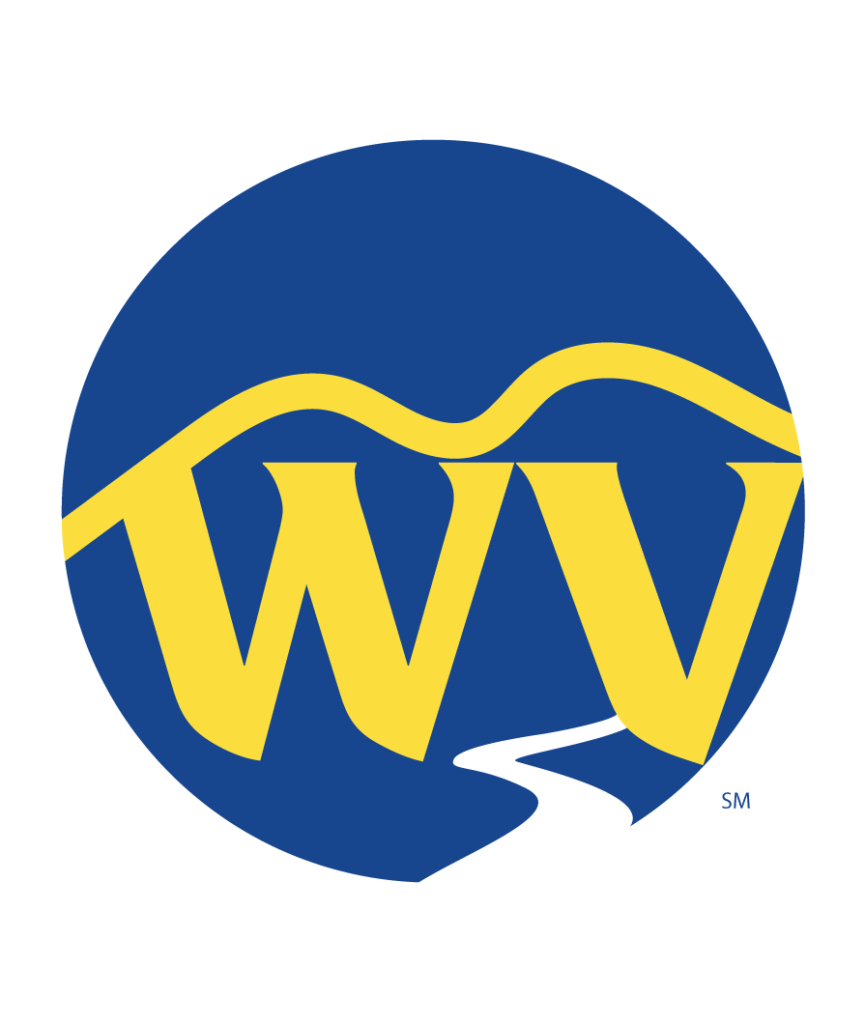
African-Americans in West Virginia WV African American Trail
African-Americans in West Virginia
Storer College Henry Louis Gates Jr Booker T Washington J R Clifford
Dr. Carter G. Woodson Rev. Dr. Leon Sullivan
